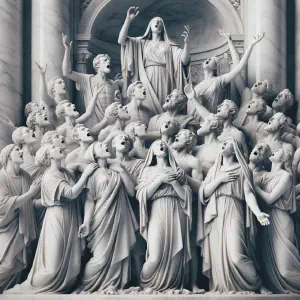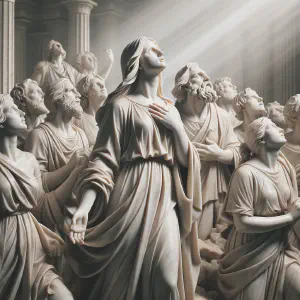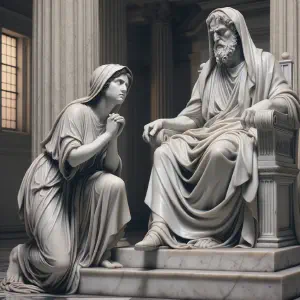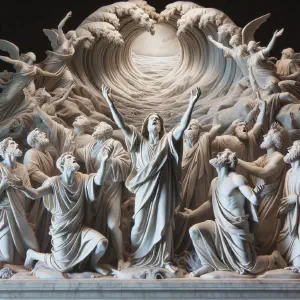The Night of Divine Intervention



Meanwhile, in a distant time, Jesus imparted wisdom to His disciples through a parable, emphasizing the necessity of persistent prayer and unwavering faith. He narrated the story of a persistent widow, who, despite facing a judge devoid of fear for God or respect for humanity, never ceased to seek justice. This parable served as a reminder of God’s unfailing justice and His responsiveness to those who call upon Him day and night. Jesus questioned, however, whether such faith would endure until His return. This story connected the past and present, urging the faithful to remember God’s past deeds and to persist in faith, trusting in His eternal justice and mercy.
Five Questions
What is the significance of the ‘word’ descending from heaven in the Wisdom readings?
The ‘word’ symbolizes the powerful and active presence of God in the world. It represents God’s command, which is both a creative and transformative force. In the context of the Wisdom readings, it highlights the idea that God’s will is executed with precision and purpose, and it emphasizes His involvement in the events of the world, particularly in guiding and protecting His people.
How do the events of the Red Sea relate to the themes of miracles and providence?
The parting of the Red Sea is one of the most iconic miracles in the Bible. It demonstrates God’s direct intervention in human history to save His people. This event serves as a powerful example of divine providence, where God not only foresees but also provides for the needs of His people. In this case, it was their need for deliverance from slavery and a path to freedom.
In the Psalm, why is there a focus on remembering the marvels the Lord has done?
Remembering the marvels the Lord has done serves a dual purpose. Firstly, it’s a form of worship, acknowledging God’s greatness and giving Him the glory. Secondly, it strengthens faith, especially in times of trouble or uncertainty. Recalling God’s past deeds assures the faithful of His presence and constant care, reinforcing their trust in His future actions.
What lesson can we draw from the parable of the persistent widow in Luke’s Gospel?
The parable of the persistent widow teaches about the importance of perseverance in prayer and faith. It suggests that if even a dishonest judge can grant justice due to persistence, how much more will God, who is just and loving, respond to the persistent prayers of His people. It’s a call to be steadfast in prayer and trust in God’s timing and justice.
How does the question Jesus poses at the end of the parable challenge believers?
Jesus’ question, “But when the Son of Man comes, will he find faith on the earth?” challenges believers to examine the depth and endurance of their faith. It implies that living a life of faith is not just about momentary acts of devotion but about a continuous, enduring relationship with God. This question prompts believers to reflect on whether their faith is strong enough to withstand trials and whether they remain faithful in both good times and bad.
Bible Study
Wisdom 18:14-16; 19:6-9
R. (5a) Remember the marvels the Lord has done!
or:
R. Alleluia.
Sing to him, sing his praise,
proclaim all his wondrous deeds.
Glory in his holy name;
rejoice, O hearts that seek the LORD!
R. Remember the marvels the Lord has done!
or:
R. Alleluia.
Then he struck every firstborn throughout their land,
the first fruits of all their manhood.
And he led them forth laden with silver and gold,
with not a weakling among their tribes.
R. Remember the marvels the Lord has done!
or:
R. Alleluia.
For he remembered his holy word
to his servant Abraham.
And he led forth his people with joy;
with shouts of joy, his chosen ones.
R. Remember the marvels the Lord has done!
or:
R. Alleluia.
In these verses from Wisdom, the ‘word’ descending from heaven represents God’s active intervention in human history. This ‘word’ as a ‘fierce warrior’ symbolizes God’s judgment and protection. The passage recalls the exodus of the Israelites, led by Moses, from Egyptian bondage. This aligns with Catholic teachings on God’s providence and justice. It reflects the belief in God’s omnipotence and his special care for his chosen people, resonating with the themes of trust in divine mercy and adherence to God’s commandments.
Psalm 105:2-3, 36-37, 42-43
Jesus told his disciples a parable
about the necessity for them to pray always without becoming weary.
He said, “There was a judge in a certain town
who neither feared God nor respected any human being.
And a widow in that town used to come to him and say,
‘Render a just decision for me against my adversary.’
For a long time the judge was unwilling, but eventually he thought,
‘While it is true that I neither fear God nor respect any human being,
because this widow keeps bothering me
I shall deliver a just decision for her
lest she finally come and strike me.’”
The Lord said, “Pay attention to what the dishonest judge says.
Will not God then secure the rights of his chosen ones
who call out to him day and night?
Will he be slow to answer them?
I tell you, he will see to it that justice is done for them speedily.
But when the Son of Man comes, will he find faith on earth?”
Psalm 105 celebrates God’s faithfulness and mighty works in history, particularly in the deliverance of the Israelites. It encourages the faithful to remember and proclaim God’s deeds. This aligns with the Catholic emphasis on the importance of remembering and celebrating God’s actions in history, as a way to deepen faith and trust in His providential care. The psalm reflects the acts of mercy and God’s covenant with Abraham, reiterating themes of gratitude, praise, and remembrance as central to a life of faith.
Lessons
The passages collectively teach us about the profound power and love of God. They remind us that in moments of stillness and turmoil alike, God is actively working in the world, often in ways beyond our understanding or expectation. The parting of the Red Sea and the marvels remembered in the Psalm underscore God’s capacity for miracles and His desire to protect and lead His people. The parable of the persistent widow in Luke’s Gospel teaches the importance of unwavering prayer and faith in God’s justice. These scriptures collectively encourage us to trust in God’s providence, to continuously seek Him through prayer, and to always remember and celebrate His mighty deeds.
Meditation Prayer


